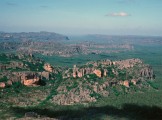



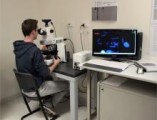
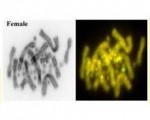
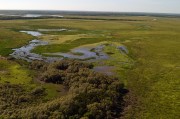
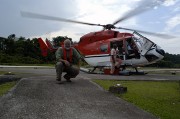
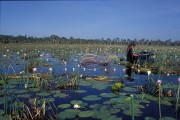
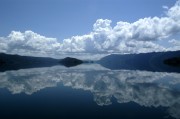

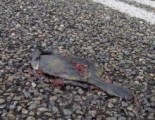
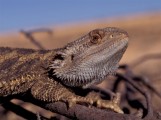
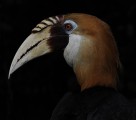
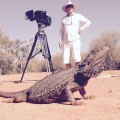
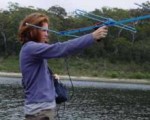

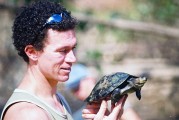
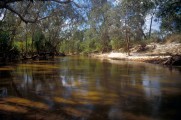
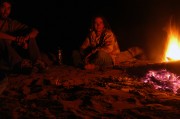
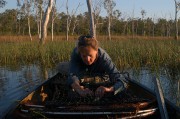

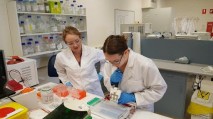
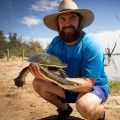


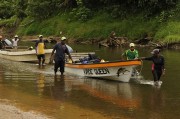
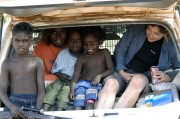
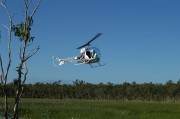
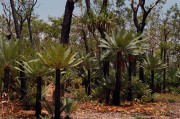
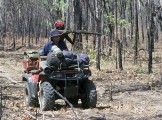
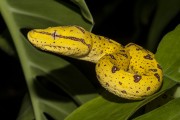
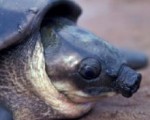
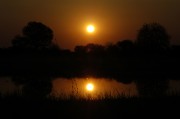
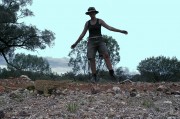
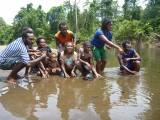


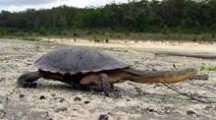
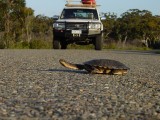
Refereed Publications
- 2025
- 2024
- 2023
- 2022
- 2021
- 2020
- 2019
- 2018
- 2017
- 2016
- 2015
- 2014
- 2013
- 2012
- 2011
- 2010
- 2009
- 2008
- 2007
- 2006
- 2005
- 2004
- 2003
- 2002
- 2001
- 2000
- 1999
- 1998
- 1997
- 1996
- 1995
- 1994
- 1993
- 1992
- 1991
- 1990
- 1989
- 1988
- 1986
- 1985
- 1983
- 1982
- 1979
2025
2025. Space use and home range size of the freshwater turtle Hydromedusa maximiliani (Testudines: Chelidae) in southeastern Brazil. Herpetological Conservation and Biology 20:67–81. [pdf]
2025. Targeted sequencing and iterative assembly of near-complete genomes. Nature Communications 16:10406. [pdf]
2025. Diagnosability to inform species delimitation for the genus Emydura (Testudines: Chelidae) from northern Australia. Zoological Journal of the Linnean Society, in review [ZOJ-07-2025-6457] (https://www.biorxiv.org/content/10.1101/2025.07.10.664252v1)
2025. A genome assembly and annotation for the Australian alpine skink Bassiana duperreyi using long-read technologies. G3: Genes | Genomes | Genetics, 15:jkaf046 [http://doi.org/10.1093/g3journal/jkaf043] [pdf]
2025. Sex chromosome dosage compensation in a sex reversing skink is not influenced by sexual phenotype. BMC Genomics, in press. [pdf]
2025. Quantifying taxon-specific habitat connectivity requirements of urban wildlife using structured expert judgement. Biological Conservation 305:110991. https://doi.org/10.1016/j.biocon.2025.110991. [pdf]
2025. Looping through evolution: divergent 3D genome architecture of spermatogenesis across vertebrates. Nature Communications, in press [11-02-2026]
2025. Does a lack of juveniles indicate a threat? Understanding body size distributions in a group of long‐lived vertebrates. Journal of Animal Ecology, online early https://doi.org/10.1111/1365-2656.70093. [pdf]
2025. A genomic-based workflow for eDNA assay development for a critically endangered turtle, Myuchelys georgesi. Ecology and Evolution 2025, 15:e70798 [https://doi.org/10.1002/ece3.70798] [pdf]
2025. Genome-wide diversity and MHC characterisation in a critically endangered freshwater turtle susceptible to disease. Immunogenetics 77:21. https://doi.org/10.1007/s00251-025-01378-8. [pdf]
2025. A near telomere-to-telomere phased genome assembly and annotation for the Australian central bearded dragon Pogona vitticeps. GigaScience 14:1-19 [http:doi.org/10.1093/gigascience/giaf085] [see also https://doi.org/10.1093/gigascience/giaf079] [pdf]
2025. Turtles of the World: Annotated Checklist and Atlas of Taxonomy, Synonymy, Distribution, and Conservation Status (10th Edition) Chelonian Research Monographs 10:1–575. [doi:10.3854/crm.10.checklist.atlas.v10.2025] [pdf]
2025. Turtles in Trouble: The World’s Most Endangered Tortoises and Freshwater Turtles – 2025. Ojai, CA: IUCN SSC Tortoise and Freshwater Turtle Specialist Group, Turtle Conservancy, Turtle Survival Alliance, Turtle Conservation Fund, Re:wild, and Chelonian Research Foundation, 77 pp. [pdf]
2025. Half of Australia's Highly Imperilled Narrow-Range Species Habitat is Outside Protected Areas. Biological Conservation 308: 111195 [SSRN http://dx.doi.org/10.2139/ssrn.5069874] [pdf]
2025. In vitro organ culture protocol for intact urogenital systems supporting gonadal differentiation. PLoS ONE PLoS One 20(7): e0327930. [https://doi.org/10.1371/journal.pone.0327930] [pdf]
2025. Thermal performance curves, activity and survival in a free-ranging ectotherm. Journal of Animal Ecology 94:1823-1836. [pdf]
2025. Establishment of adherent fibroblasts from adult P. vitticeps lung tissue. Protocols.io dx.doi.org/10.17504/protocols.io.j8nlkdbj5g5r/v1
2025. Historical Biogeography and Genetic Status of the Enigmatic Pig‐Nosed Turtle (Carettochelys insculpta) Within the Australo‐Papuan Region. Diversity and Distributions 31:e70015. https://doi.org/10.1111/ddi.70015. [pdf]
2024
2024. City dwellers: habitat connectivity and demographic responses of a semi-aquatic turtle in Australia. Urban Ecosystems, Online https://doi.org/10.1007/s11252-024-01583-5 [pdf]
2024. History and historical DNA: Identity of Chelodina intergularis Fry, 1915 and type localities of C. intergularis and C. rugosa Ogilby, 1890 Zootaxa 5448: 531–555 [pdf]
2024. Genetic & Environmental Sex Determination in Cold-Blooded Vertebrates: Fishes, Amphibians, and Reptiles. In: M.K. Skinner (ed), Encyclopedia of Reproduction (Third Edition), Academic Press. doi:10.1016/B978-0-443-21477-6.00193-0 1 [pdf]
2024. A genomic framework to assist conservation breeding and translocation success: A case study of a critically endangered turtle. Conservation Science and Practice 2024:e13204 [http:doi.org/10.1111/csp2.13204] [pdf]
2024. Maternal diet influences fecundity in a freshwater turtle undergoing population decline. Conservation Physiology 12:coae033, https://doi.org/10.1093/conphys/coae033 [pdf]
2024. The genome of the Australian water dragon (Intellagama lesueurii), an agamid model for urban adaptation Journal of Heredity, esae054, https://doi.org/10.1093/jhered/esae054 [pdf]
2024. Genome-wide identification and expression analysis of the STAT family in Reeve’s turtle (Mauremys reevesii). Biochemical Genetics 2024, https://doi.org/10.1007/s10528-024-10820-7 [pdf]
2024. In vitro organ culture of intact urogenital systems supporting gonadal differentiation. protocols.io, doi:10.17504/protocols.io.kqdg3qxj1v25/v1
2024. Unraveling Bird DNAJC15 Gene Evolution via Codon Usage Analysis Submitted
2023
2023. Opportunities for Research and Conservation of Freshwater Turtles in Australia. Austral Ecology 48:1483-1491. [pdf]
2023. Warming reduces activity time and increases vulnerability to climate change in a temperate-zone lizard. Scientific Reports 13:9603 [https://doi.org/10.1038/s41598-023-35087-7] [pdf]
2023. Distribution of freshwater turtle rock art and archaeological sites in Australia: a glimpse into Aboriginal use of chelonians. Herpetological Conservation and Biology 18:374–391. [pdf]
2023. Distances and their visualization in studies of spatial-temporal genetic variation using single nucleotide polymorphisms (SNPs). BioxRiv https://doi.org/10.1101/2023.03.22.533737. [pdf]
2023. Molecular sex identification for applications in conservation, industry and veterinary medicine. Pp 74-101 (Chapter 8) in Holleley, C.E., Berry, O. and Jarman, S. Applied Ecological Genetics. CSIRO Publishing, Canberra [pdf]
2023. Polyandry and non-random fertilisation maintain long-term genetic diversity in an isolated island population of adders (<i>Vipera berus</i>) Heredity 130:64–72. [pdf]
2023. The ecology and morphology of Australia’s desert turtle (Emydura macquarii emmotti). Austral Ecology 8:1657-1680 [http://dx.doi.org/10.1111/aec.13434] [pdf]
2023. Turtles in trouble. Conservation ecology and priorities for Australian freshwater turtles. Austral Ecology 8:1603-1656. [https://doi.org/10.1111/aec.13418] [pdf]
2023. Polygenic sex determination in vertebrates – is there any such thing? Trends in Genetics 39: 242-250. [pdf]
2023. The Australian Gulf Snapping Turtle <i>Elseya lavarackorum</i> (Testudines: Chelidae) revisited – is the late Pleistocene fossil species extant? Vertebrate Zoology 73:237–256, http:\\doi.org\10.3897/vz.73.e99495. [pdf]
2023. Draft genomes of a male and female Australian jacky dragon (Amphibolurus muricatus). BioXriv [https://doi.org/10.1101/2021.10.11.463868] [pdf]
2023. Gene expression of male pathway genes sox9 and amh during early sex differentiation in a reptile departs from the classical amniote model. BMC Genomics 24:243, https://doi.org/10.1186/s12864-023-09334-0 [pdf]
2023. Three dimensions of thermolabile sex determination. Bioessays 45:e2200123 [https://doi.org/10.1002/bies.202200123] [pdf]
2023. Metabolic consequences of sex-reversal in two lizard species: a test of the like genotype and like phenotype hypotheses. Journal of Experimental Biology 226 (13): jeb245657. [pdf]
2022
2022. Lineage diversity within a widespread endemic Australian skink to better inform conservation in response to regional-scale disturbance. Ecology and Evolution 2:e8627 [pdf]
2022. A male-specific sex marker for the endangered western saw-shelled turtle (Myuchelys bellii) using in silico whole-genome subtraction. Conservation Genetics Resources 14:231–236. [pdf]
2022. Meiotic chromosome dynamics and double strand break formation in reptiles. Frontiers in Cell and Developmental Biology Cell Dev. Biol. 10:1009776 [doi: 10.3389/fcell.2022.1009776]. [pdf]
2022. dartR v2: an accessible genetic analysis platform for conservation, ecology, and agriculture Methods in Ecology and Evolution 13:2150–2158 [pdf]
2022. Optimising the hatching success of artificially incubated eggs for use in a conservation program for the western saw-shelled turtle (<i>Myuchelys bellii</i>) Australian Journal of Zoology 70:74-82. [pdf]
2022. Plotting for change: an analytic framework to aid decisions on which lineages are candidate species in phylogenomic species discovery. Biological Journal of the Linnean Society 135:117–137. [pdf]
2022. Developmental dynamics of sex reprogramming by high incubation temperatures in a dragon lizard. BMC Genomics 23:322 [pdf]
2022. Truncated jarid2 and kdm6b transcripts are associated with temperature-induced sex reversal during development in a dragon lizard. Science Advances 8:eabk0275 [pdf]
2022. Evolutionary stability inferred for a free ranging lizard with sex-reversal. Molecular Ecology 31:2281-2292.
2022. Sex-specific splicing of Z- and W-borne nr5a1 alleles suggests sex determination is controlled by chromosome conformation PNAS (Proceedings of the National Academy of Sciences USA) 119(4):e2116475119 [pdf]
2022. Diversity of reptile sex chromosome evolution revealed by cytogenetic and linked-read sequencing. Zoological Research 43:719-733 [pdf]
2021
2021. Sex determination mechanisms among populations within cryptic species complex of Calotes (Squamata: Agamidae: Draconinae). DNA 1:49–67 [pdf]
2021. Corticosterone does not have a role in temperature sex reversal in the central bearded dragon (Pogona vitticeps). Journal of Experimental Zoology 335:301-310. [pdf]
2021. Evolving thermal thresholds may explain the distribution of temperature sex reversal in an Australian dragon lizard (Pogona vitticeps). Diversity and Distributions 27:427-438. [pdf]
2021. High altitude increases the risk of Y chromosome loss in Alpine skink populations with sex reversal. Heredity 126:805–816 [pdf]
2021. Effects of natural nest temperatures on sex reversal and sex ratios in an Australian alpine skink. Scientific Reports11:20093. [pdf]
2021. Concerning the article by Ehl et al. – false premise leads to false conclusions. Sexual Development 15: 286–288. https://doi.org/10.1159/000518374. [pdf]
2021. A return-on-investment approach for prioritization of rigorous taxonomic research needed to inform responses to the biodiversity crisis PLoS Biology 19:e3001210. [pdf]
2021. Turtles of the World: Annotated Checklist and Atlas of Taxonomy, Synonymy, Distribution, and Conservation Status (9th Edition) Chelonian Conservation Monographs 8:1-472 [pdf]
2021. Do male and female heterogamety really differ in expression regulation? Lack of global dosage balance in pygopodid geckos. Philosophical Transactions of the Royal Society 376B: 20200102. [pdf]
2021. Sexual development and the environment: Conclusions from 40 years of theory. Sexual Development 15:7-22 [pdf]
2021. Phylogenetic study of thermophilic genera <i>Anoxybacillus, Geobacillus, Parageobacillus</i>, and proposal of a new classification <i>Quasigeobacillus</i> gen. nov. bioXriv (https://www.biorxiv.org/content/10.1101/2021.06.18.449068v1)
2021. omicR: a tool to facilitate BLASTn alignments for sequence data. SofwareX 14:100702. (https://doi.org/10.1016/j.softx.2021.100702) [pdf]
2021. Microchromosomes are building blocks of bird, reptile and mammal chromosomes. Proceedings of the National Academy of Sciences USA 118(45): e2112494118. [pdf]
2021. Ovotestes suggest cryptic genetic influence in a reptile model for temperature dependent sex determination. Proceedings of the Royal Society of London, Series B. 288:20202819 [https://doi.org/10.1098/rspb.2020.3010] [pdf]
2021. Temperature induced sex reversal in reptiles: Prevalence, discovery, and evolutionary implications. Sexual Development 15:148–156 [pdf]
2021. Two transcriptionally distinct pathways drive female development in a reptile with genetic sex determination and temperature induced sex reversal. PLoS Genetics 17:e1009465 [pdf]
2021. Dynamics of epigenetic modifiers and environmentally sensitive proteins in a reptile with temperature induced sex reversal. Biology of Reproduction 106:132–144 [pdf]
2021. Australian lizards are outstanding models for reproductive biology research. Australian Journal of Zoology 68:168-199 [pdf]
2020
2020. Cross-species BAC mapping highlights conservation of chromosome synteny across dragon lizards (Squamata: Agamidae) Genes 11, 698. [pdf]
2020. Karyotype characterisation of two Australian dragon lizards (Squamata: Agamidae: Amphibolurinae) reveals subtle chromosomal rearrangements between related species with similar karyotypes, Cytogenetic and Genome Research 160:610–623
2020. Disease surveillance of the amphibian chytrid fungus Batrachochytrium dendrobatidis in Papua New Guinea. Conservation Science and Practice 2:e256. https://doi.org/10.1111/csp2.256. [pdf]
2020. Genetic structure and diversity of Australian freshwater crocodiles (Crocodylus johnstoni) from the Kimberley, Western Australia. Conservation Genetics 21:421–429. [pdf]
2020. MicroRNA dynamics during hibernation of the Australian central bearded dragon (Pogona vitticeps). Scientific Reports 10:17854, doi.org/10.1038/s41598-020-73706-9 [pdf]
2020. Cellular calcium and redox regulation: The mediator of vertebrate environmental sex determination? Biological Reviews 95:680-695. [pdf]
2020. On a razor’s edge: status and prospects of the critically endangered Bellinger River snapping turtle, Myuchelys georgesi. Aquatic Conservation 30:586-600. [pdf]
2020. Viviparous reptile regarded to have temperature-dependent sex determination has old XY chromosomes. Genome Biology and Evolution 12:924–930. [pdf]
2020. Identification of Y chromosome markers in the eastern three-lined skink (Bassiana duperreyi) using in-silico whole genome subtraction. BMC Genomics 21:667. [pdf]
2020. Reproductive phenotype predicts adult bite-force performance in sex-reversed dragons. Journal of Experimental Zoology A 333:252-263. [pdf]
2020. Genetic rescue restores long-term population viability. Current Biology 30:R1283–R1300 [pdf]
2020. Genetic evidence supports three previously described species of Greater Glider, Petauroides volans, P. minor, and P. armillatus. Scientific Reports 10:19284 [pdf]
2020. Climate change, sex reversal and lability of sex determining mechanisms Journal of Evolutionary Biology 33:270-281. [pdf]
2020. The identity of Chelodina oblonga Gray 1841 (Chelonia: Chelidae) reassessed. Zootaxa 4779:419–437. [pdf]
2020. Turtles and tortoises are in trouble. Current Biology 30:R721–R735. [pdf]
2020. Discovery of thermophilic Bacillales using reduced-representation genotyping for identification. BMC Microbiology 20:114. [pdf]
2019
2019. Island of Opportunity: Can New Guinea protect amphibians from a globally emerging pathogen? Frontiers in Ecology and the Environment 17:348-354. [pdf]
2019. Waking the sleeping dragon: transcriptional profiling of a hibernating reptile. BMC Genomics 20:460. [pdf]
2019. Mitogenomics of historical type specimens of Australasian turtles: clarification of taxonomic confusion and old mitochondrial introgression. Scientific Reports 9:5841. [pdf]
2019. ZW sex chromosomes in Australian dragon lizards (Agamidae) originated from a combination of duplication and translocation in the nucleolar organizing region. Genes 10:861 [pdf]
2019. Identification of bacterial isolates from a public hospital in Australia using complexity-reduced genotyping. Microbiological Methods 160:11-19. [pdf]
2019. Perspectives on the clonal persistence of presumed ‘ghost’ genomes in unisexual or allopolyploid taxa arising via hybridization Scientific Reports 9:4730. [pdf]
2019. Phylogeography and species delimitation of <i>Cherax destructor</i> (Decapoda: Parastacidae) using Genome-wide SNPs. Marine and Freshwater Research 70:857–869. [pdf]
2019. Conservation implications of turtle declines in Australia’s Murray River system. Scientific Reports 9:1998. [pdf]
2018
2018. Did Lizards Follow Unique Pathways in Sex Chromosome Evolution? Genes 2018 9(5):239
2018. Book Review: “Freshwater Turtles of Australia” by John Cann and Ross Sadlier. CSIRO Publishing, Australia. Australian Journal of Zoology 66:84–87. [pdf]
2018. How does temperature determine sex? Temperature-responsive epigenetic regulation clarifies a 50-year-old mystery in reptiles. Science 360:601-602 [pdf]
2018. Genome-wide SNP markers breathe new life into phylogeography and species delimitation for the problematic short-necked turtles (Chelidae: Emydura) of eastern Australia. Molecular Ecology 27:5195-5213 [pdf]
2018. Assault from all sides: hybridization and introgression threaten the already critically endangered <i>Myuchelys georgesi</i> (Chelonia: Chelidae) Endangered Species Research 37: 239–247. [pdf]
2018. dartR: an R package to facilitate analysis of SNP data generated from reduced representation genome sequencing. Molecular Ecology Resources 18:691–699 [pdf]
2018. Adaptation and conservation insights from the koala genome. Nature Genetics 50:1102–1111. [pdf]
2018. Herpetofauna of the Wau Creek proposed Wildlife Management Area, Gulf Province, Papua New Guinea. Pp. 83-96 In: Richards, S.J. (Editor). Rapid biological assessments of Wau Creek, Uro Creek and Lake Kutubu: documenting biodiversity values to promote forest conservation in the Kikori River basin, Papua New Guinea. ExxonMobil PNG Limited. Port Moresby. [pdf]
2018. Profiling a possible rapid extinction event in a long-lived species. Biological Conservation 221:190-197. [pdf]
2018. Turtles in Trouble. The World's 25+ Most Endangered Tortoises and Freshwater Turtles -- 2018. Turtle Conservancy, Ojai, California, USA [pdf]
2018. Developmental plasticity in reptiles: Physiological mechanisms and ecological consequences. Journal of Experimental Zoology 329:153-161 [pdf]
2018. Developmental asynchrony and antagonism of sex determination pathways in a lizard with temperature-induced sex reversal. Scientific Reports 8:14892 [pdf]
2017
2017. Amphibians on the brink. Preemptive policies can protect amphibians from devastating fungal diseases. Science 357:454-455. [pdf]
2017. Differential intron retention in Jumonji chromatin modifier genes is implicated in reptile temperature-dependent sex determination Science Advances 3:e1700731. [pdf]
2017. Responses of an Australian freshwater turtle to drought-flood cycles along a natural to urban gradient Austral Ecology 42:442–455 [pdf]
2017. Turtles of Cooper Creek -- Life in the slow lane. Pp. 55-62 in Kingsford, R. (Ed.). Lake Eyre Basin Rivers. Environmental, Social and Economic Importance. CSIRO Publishing, Canberra, Australia. [pdf]
2017. Turtles of the World: Annotated Checklist and Atlas of Taxonomy, Synonymy, Distribution, and Conservation Status (8th Edition) Chelonian Conservation Monographs 7:1-292. [pdf]
2017. Resource partitioning among five sympatric species of freshwater turtles from the wet–dry tropics of northern Australia Wildlife Research 44:219-229. [pdf]
2017. Sex determination mode does not affect body or genital development of the central bearded dragon (Pogona vitticeps). EvoDevo 8:25. [pdf]
2017. Resolution of the enigmatic phylogenetic relationship of the critically endangered Western Swamp Tortoise Pseudemydura umbrina (Pleurodira: Chelidae) using a complete mitochondrial genome. Molecular Phylogenetics and Evolution 115:58–61. [pdf]
2016
2016. Salinity tolerances of two Australian freshwater turtles, Chelodina expansa and Emydura macquarii (Testudinata:Chelidae). Conservation Physiology 4: cow42, 1-9. [pdf]
2016. Dispersal and climate warming determine range shift in model reptile populations. Ecological Modelling 328:34-43. [pdf]
2016. Anchoring genome sequence to chromosomes of the central bearded dragon (Pogona vitticeps) enables reconstruction of ancestral squamate macrochromosomes and identifies sequence content of the Z chromosome. BMC Genomics 17:447. [pdf]
2016. Movement patterns and activity of the Brazilian snake-necked turtle Hydromedusa maximiliani (Testudines: Chelidae) in southeastern Brazil. Amphibia-Reptilia 37:215-228. [pdf]
2016. Isotopic niche in the eastern long-necked turtle Chelodina longicollis (Testudines: Chelidae) along a natural-urban gradient in southeastern Australia. Herpetological Journal 26:297-304. [pdf]
2016. Urban hazards: Spatial ecology and survivorship of a turtle in an expanding suburban environment. Urban Ecosystems 19:415-428. [pdf]
2016. Sex reversal in reptiles: reproductive oddity or powerful driver of evolutionary change? Sexual Development doi:10.1159/000450972. [pdf]
2016. The behavioural consequences of sex reversal in dragons. Proceedings of the Royal Society London, Series B 283: 20160217. [pdf]
2016. Identification of interleukin genes in Pogona vitticeps using a de novo transcriptome assembly from RNA-Seq data Immunogenetics 68:719–731. [pdf]
2016. Amplification of microsatellite repeat motifs is associated with the evolutionary differentiation and heterochromatinization of sex chromosomes in Sauropsida. Chromosoma 125:111-123. [pdf]
2016. Thyroid hormone modulates offspring sex ratio in a turtle with temperature-dependent sex determination. Proceedings of the Royal Society, London, Series B 283:20161026. [pdf]
2016. A new species of freshwater turtle of the genus Elseya (Testudinata: Pleurodira: Chelidae) from the Northern Territory of Australia. Zootaxa 4061:18-28. [pdf]
2015
2015. Myuchelys georgesi (Cann, 1997) -- Bellinger River Turtle. Chelonian Research Monographs 5, doi:10.3854/crm.5.091.georgesi.v1.2015. [pdf]
2015. Salinity of the coastal nesting environment and its association with body size in the estuarine pig-nosed turtle. Journal of Zoology, London 295:65-74 [pdf]
2015. Defining priority areas through social and biological data for the pig-nosed turtle (Carettochelys insculpta) conservation program in the Kikori Region, Papua New Guinea. Journal for Nature Conservation 28:19-25. [pdf]
2015. Spatial and temporal trends in pig-nosed turtle (Carettochelys insculpta) harvest in Papua New Guinea. Oryx 49:659-668. [pdf]
2015. An annotated type catalogue of the turtles (Testudines: Pleurodira: Chelidae) in the collection of the Western Australian Museum. Records of the Western Australian Museum 30:52-60 [pdf]
2015. First record of hatchling overwintering in a chelid turtle. Australian Journal of Zoology 63, 287-291. [pdf]
2015. Myuchelys bellii (Gray, 1844) -- Western Saw-shelled Turtle, Bell's Turtle. Chelonian Research Monographs 5(8):088.7, doi:10.3854/crm.5.088.bellii.v1.2015. [pdf]
2015. High-coverage sequencing and annotated assembly of the genome of the Australian dragon lizard Pogona vitticeps. GigaScience 4:45 [pdf]
2015. The genome of the Australian dragon lizard Pogona vitticeps. GigaScience Database [http://gigadb.org/dataset/100166]
2015. Assessing biodiversity and endemism using phylogenetic methods across multiple taxonomic groups. Ecology and Evolution 5:5177-5192. [pdf]
2015. Significant genetic structure despite high vagility revealed through mitochondrial phylogeography of an Australian freshwater turtle, Chelodina longicollis. Marine and Freshwater Research 66:1045-1056. [pdf]
2015. Sex reversal triggers the rapid transition from genetic to temperature-dependent sex. Nature 523:79-82. [pdf]
2015. The Genome 10K Project -- A Way Forward. Annual Review of Animal Biosciences 3:57-111 [pdf]
2015. Comment on Spracklandus Hoser, 2009 (Reptilia, Serpentes, ELAPIDAE): request for confirmation of the availability of the generic name and for the nomenclatural validation of the journal in which it was published (Case 3601; BZN 70:234-237; 71:30-38; 133-1 Bulletin of Zoological Nomenclature 72(1):65-78. [pdf]
2015. Phylogenetic uncertainty and taxonomic re-revisions: an example from the Australian short-necked turtles (Testudines: Chelidae). Copeia 103:536-540 [pdf]
2015. A new species and subgenus of Elseya (Testudines: Pleurodira: Chelidae) from New Guinea. Zootaxa 4006:59-82. [pdf]
2014
2014. Global biodiversity assessment and hyper-cryptic species complexes: more than one species of elephant in the room? Systematic Biology 63:518-533. [pdf]
2014. Chelodina expansa Gray 1857 -- Broad-Shelled Turtle, Giant Snake-Necked Turtle Chelonian Research Monographs 5: doi:10.3854/crm.5.071.expansa.v1.2014 [pdf]
2014. Under what conditions do climate-driven sex ratios enhance versus diminish population persistence. Ecology and Evolution 4:4522-4533. [pdf]
2014. How do climate-linked sex ratios and dispersal limit range boundaries? BMC Ecology 14:19. [pdf]
2014. Reptile bycatch in a pest-exclusion fence established for wildlife reintroductions Journal for Nature Conservation 22:577-585 [pdf]
2014. Contemporary genetic structure of an endemic freshwater turtle reflects Miocene orogenesis of New Guinea. Biological Journal of the Linnean Society 111:192-208 [pdf]
2014. Phylogeography of the Australian freshwater turtle Chelodina expansa reveals complex relationships among inland and coastal bioregions. Biological Journal of the Linnean Society 111:789-805. [pdf]
2014. Molecular evolution of Dmrt1 accompanies change of sex determining mechanisms in Reptilia. Biology Letters 10:20140809. [pdf]
2014. Chelodina oblonga Gray 1841 -- Northern Snake-necked Turtle Chelonian Research Monographs 5: doi:10.3854/crm.5.077.oblonga.v1.2014. [pdf]
2014. Non-homologous sex chromosomes in two geckos (Gekkonidae: Gekkota) with female heterogamety. Cytogenetic and Genome Research 143:251-258. [pdf]
2014. Highly differentiated ZW sex microchromosomes in the Australian Varanus species evolved through rapid amplification of repetitive sequences PLoS One 9(4): e95226. [pdf]
2014. The risk of inter-specific competition in Australian short-necked turtles. Ecological Research 29:767-777. [pdf]
2014. A biogeographical history and timeline for the evolution of Australian snapping turtles (Elseya: Chelidae) in Australia and New Guinea. Journal of Biogeography 41:905-918. [pdf]
2014. A complete mitochondrial genome sequence for the Australian turtle, Chelodina longicollis obtained using 454-pyrosequencing. Conservation Genetics Resources 6:555-557 [pdf]
2013
2013. The Conservation Status of the World's Reptiles. Biological Conservation 157:372-385. [pdf]
2013. Salinity of incubation media influences embryonic development of a freshwater turtle. Journal of Comparative Physiology Series B 183:235-241. [pdf]
2013. Sequence and gene content of a large fragment of a lizard sex chromosome and evaluation of candidate sex differentiating gene R-spondin1. BMC Genomics 14, 899. [pdf]
2013. Uses, beliefs and conservation of turtles by Ashaninka indigenous people, central Peru. Chelonian Conservation and Biology 12:308-313. [pdf]
2013. Feeding habits of Amazonian freshwater turtles (Podocnemididae and Chelidae) from Peru. Chelonian Conservation and Biology 12:119-126. [pdf]
2013. Commentary: For reptiles with temperature-dependent sex determination, thermal variability may be as important as thermal averages. Animal Conservation 16, 493-494. [pdf]
2013. Resolving the phylogenetic history of the short-necked turtles, genera Elseya and Myuchelys (Testudines: Chelidae) from Australia and New Guinea. Molecular Phylogenetics and Evolution, 68:251-258. [pdf]
2013. Karyotypic analysis and FISH mapping of microsatellite motifs reveal highly differentiated XX/XY sex chromosomes in the pink-tailed worm-lizard (Aprasia parapulchella, Pygopodidae, Squamata). Molecular Cytogenetics 6:60. [pdf]
2013. Novel evolutionary pathways of sex determining mechanisms. Journal of Evolutionary Biology 26:2544-2557. [pdf]
2013. Contemporary genetic structure reflects historical drainage isolation in an Australian snapping turtle, Elseya albagula. Zoological Journal of the Linnean Society, London, 169, 200-214. [pdf]
2013. Molecular cytogenetic map of the central bearded dragon Pogona vitticeps (Squamata: Agamidae). Chromosome Research 21:361-374. [pdf]
2012
2012. Movement and habitat use of Australia's largest snake-necked turtle: implications for water management. Journal of Zoology, London 287:76-80 [pdf]
2012. Ecological and physiological impacts of salinisation on freshwater turtles of the lower Murray River. Wildlife Research 39:705-710. [pdf]
2012. Biology and conservation of the freshwater turtles and tortoises of Peru. IRCF Reptiles and Amphibians 19:103-116.
2012. Mary River Turtle Elusor macrurus Cann and Legler, 1994 In Curtis, L.K. Dennis, A.J., McDonald, K.R., Kyne P.K. and Debus, S.J.S. (Eds) Queensland's Threatened Animals. (Eds) pp. 201-202. CSIRO Publishing, Melbourne.
2012. Mitochondrial variation among Australian freshwater turtles (genus Myuchelys), with special reference to the endangered M. bellii. Endangered Species Research 17:63-71. [pdf]
2012. Isolation and characterisation of novel microsatellite and mitochondrial DNA markers for the Eastern Water Dragon (Physignathus lesueurii). Conservation Genetics Resources 4:13-116. [pdf]
2012. Are some chromosomes particularly good at sex? Insights from amniotes. Chromosome Research 20:7-19. [pdf]
2011
2011. Demonstrating decline of an iconic species under sustained indigenous harvest -- the pig-nosed turtle (Carettochelys insculpta) in Papua New Guinea. Biological Conservation 144:2282-2288. [pdf]
2011. Application of the precautionary principle to taxa of uncertain status-the case of the Bellinger River Turtle. Endangered Species Research 14:127-134. [pdf]
2011. Amphibians and reptiles. Chp 8 in BJ Pusey (Ed.), Aquatic Biodiversity in Northern Australia: Patterns, threats and future. Charles Darwic University Press: Darwin pp 93-110
2011. Evolutionary transitions between mechanisms of sex determination in vertebrates. Biology Letters 7:443-448 [pdf]
2011. Comparing and combining distance-based and character-based approaches for barcoding turtles. Molecular Ecology Resources 11:956-967. [pdf]
2011. Suburbs: Dangers or Drought Refugia for Freshwater Turtle Populations? Journal of Wildlife Management 75:1544-1552. [pdf]
2011. Transitions between sex determining systems in reptiles and amphibians. Annual Review of Genomics and Human Genetics 12:391-406. [pdf]
2011. Chelodina burrungandjii Thomson, Kennett and Georges 2000 - Sandstone Snake-necked Turtle. Chelonian Conservation Monographs 5, doi:10.3854/crm.5.056.burrungandjii.v1.2011 [pdf]
2011. Australian marsupial species identification. Forensic Science International. Genetics Supplement Series 3:e543-544 [pdf]
2010
2010. DNA Detective: A Review of Molecular Approaches to Wildlife Forensics. Forensic Science, Medicine and Pathology 6:180-194 [pdf]
2010. Nesting behaviour of the Pig-Nosed Turtle, Carettochelys insculpta, in Australia Chelonian Conservation and Biology, 8:185-191
2010. Sex chromosome evolution in lizards: independent origins and rapid transitions. Cytogenetic and Genome Research 127:249-260. [pdf]
2010. Diversity of Australasian freshwater turtles, with an annotated synonymy and keys to species. Zootaxa 2496:1-37. [pdf]
2010. Are reptiles predisposed to temperature-dependent sex determination? Sexual Development 4:7-15 [pdf]
2010. Non-homologous sex chromosomes of birds and snakes share repetitive sequences. Chromosome Research 18:787-800. [pdf]
2010. Extension, single-locus conversion and physical mapping of sex chromosome sequences identify the Z microchromosome and pseudo-autosomal region in a dragon lizard, Pogona vitticeps. Heredity 104:410-417 [pdf]
2010. Current issues in species identification for forensic science and the validity of using the cytochrome oxidase I (COI) gene. Forensic Science, Medicine and Pathology 6:233-241. [pdf]
2009
2009. Development of microsatellite markers in the Australasian snake-necked turtle Chelodina rugosa, and cross-species amplification Molecular Ecology Resources 9:350-353. [pdf]
2009. A global analysis of tortoise and freshwater turtle distributions with identification of priority conservation areas. Chelonian Conservation and Biology 8:116-149 [pdf]
2009. Superficial lizards in cold climates: Nest site choice along an elevational gradient. Austral Ecology 34:7733-779
2009. Population-level declines in Australian predators caused by an invasive species. Animal conservation 12:46-53
2009. Telemetry tagging methods for some freshwater reptiles. Marine and Freshwater Research 60:293-298. [pdf]
2009. The ZW sex microchromosomes of an Australian dragon lizard share no homology with those of other reptiles or birds. Chromosome Research 17:965-973 [pdf]
2009. Molecular marker suggests rapid changes of sex-determining mechanisms in Australian dragon lizards. Chromosome Research 17:91-98. [pdf]
2009. Experimental evidence for density dependent responses to mortality of snake-necked turtles. Oecologia 159:271-281. [pdf]
2009. Comment on the proposed precedence of Chelodina rugosa Ogilby, 1890 (currently Macrochelodina rugosa; Reptilia, Testudines) over Chelodina oblonga Gray, 1841 (Case 3351; see BZN 63: 187-193, 64: 68, 127-128). Bulletin of Zoological Nomenclature 66:in press.
2009. Chelodina longicollis (Shaw 1784): Eastern Long-necked Turtle. Chelonian Research Monographs 5:doi:10.3854/crm.5.031.longicollis.v1.2009.. [pdf]
2009. A new subspecies of Batagur affinis (Cantor, 1847), one of the world's most critically endangered chelonians (Testudines: Geoemydidae). Zootaxa 2233:57-68 [pdf]
2009. Isolation and development of a molecular sex marker for Bassiana duperreyi, a lizard with XX/XY sex chromosomes and temperature-induced sex reversal. Molecular Genetics and Genomics 281:665-672 [pdf]
2009. Life in the suburbs: behavior and survival of a freshwater turtle in response to drought and urbanization Biological Conservation 142:3172-3181. [pdf]
2009. Responses of freshwater turtles to drought: The past, present and implications for future climate change in Australia. Chapter 11:175-190 in Gow, K. (Ed). Meltdown: Climate Change, Natural Disasters and other Catastrophes -- Fears and Concerns for the Future. Nova Science Publishers, New York. [pdf]
2009. Temporal and spatial variation in landscape connectivity for an Australian freshwater turtle in a temporally dynamic wetland system. Ecological Applications 19:1288-1299. [pdf]
2009. Genetics in conservation and wildlife management: A revolution since Caughley. Wildlife Research 36:70-80. [pdf]
2009. A new genus for Elseya latisternum and related forms of Australian freshwater turtle (Testudines: Pleurodira: Chelidae). Zootaxa 2053:32-42 [pdf]
2008
2008. Wildlife across our borders: A review of the illegal trade in Australia. Australian Journal of Forensic Science 40:199-212.
2008. A simple non-invasive protocol to establish primary cell lines from tail and toe explants for cytogenetic studies in Australian dragon lizards (Squamata: Agamidae). Cytotechnology 58:135-139 [pdf]
2008. Indigenous harvest, exotic pig predation and local persistence of a long-lived vertebrate: managing a tropical freshwater turtle for sustainability and conservation. Journal of Applied Ecology 45:52-62. [pdf]
2008. Freshwater turtles of the Kikori Drainage, Papua New Guinea, with special reference to the pig-nosed turtle, Carettochelys insculpta. Wildlife Research 35:700-711. [pdf]
2008. Carettochelys insculpta Ramsay 1886: Pig-nosed Turtle, Fly River Turtle. Chelonian Research Monographs 5:9.1-9.17 [doi:103854/crm.5.009.insculpta.v1.2008] [pdf]
2008. Applied Ecology. Pp. 227-232 in S.E. Jorgensen and B.D. Fath (Eds). <em>Encyclopedia of Ecology</em>, Volume 1, 1st Edition. Oxford: Elsevier.
2008. An XX/XY heteromorphic sex chromosome system in the Australian chelid turtle Emydura macquarii : A new piece in the puzzle of sex chromosome evolution in turtles. Chromosome Research 16:815-825. [pdf]
2008. Genetic evidence for the co-occurrence of chromosomal and thermal sex determining systems in a lizard. Biology Letters 4:176-178 [pdf]
2008. Chelodina longicollis (Eastern Long-necked Turtle). Drinking Behavior. Herpetoligical Review 39:212-213. [pdf]
2008. Terrestrial activity, movements, and spatial ecology of an Australian freshwater turtle, Chelodina longicollis in a temporally dynamic wetland system. Austral Ecology 33:1045-1056. [pdf]
2008. Maintenance of variable responses for coping with wetland drying in freshwater turtles. Ecology 89:485-494. [pdf]
2008. Energy and water flux during terrestrial estivation and overland movement in a freshwater turtle. Physiological and Biochemical Zoology 81:570-583. [pdf]
2007
2007. Genetic Issues in Freshwater Turtle and Tortoise Conservation. Chelonian Research Monographs 4:107-123 [pdf]
2007. Environmental manipulation to avoid a unique predator: Drinking hole excavation in the Agile Wallaby, Macropus agilis Ethology 113:128-136. [pdf]
2007. Demographic response of snake-necked turtles correlates with indigenous harvest and feral pig predation in tropical northern Australia. Journal of Animal Ecology 76:1231-1243. [pdf]
2007. Optimal conditions for egg storage, incubation and post-hatching growth for the freshwater turtle, Chelodina rugosa: Science in support of an indigenous enterprise. Aquaculture 270:105-114. [pdf]
2007. From molecules to organisms: Research applications of modern genetic tools for turtle biology and conservation. Chelonian Research Monographs 4:47-72. [pdf]
2007. How is the gender of some reptiles determined by temperature? Scientific American, June 2007. [pdf]
2007. Temperature sex reversal implies sex gene dosage in a reptile. Science 316:411, plus supplement. [pdf]
2007. Heterogeneous wetland complexes, buffer zones and travel corridors: Landscape management for freshwater reptiles. Biological Conservation 135:67-76. [pdf]
2007. Defining Turtle Diversity: Proceedings of a Workshop on Genetics, Ethics, and Taxonomy of Freshwater Turtles and Tortoises. Executive Summary. Chelonian Research Monographs 4:13-14.
2006
2006. Indirect impacts of invasive cane toads (Bufo marinus) on nest survival of Pig-nosed Turtles (Carettochelys insculpta). Wildlife Research 33:349-354.
2006. Nest site choice compensates for climate effects on sex ratios in a lizard with environmental sex determination. Evolutionary Ecology 20:307-330. [pdf]
2006. Quantifying nest site choice in reptiles using hemispherical photography and gap light analysis. Herpetological Review 37:49-52
2006. An XX/XY sex micro-chromosome system in a freshwater turtle, Chelodina longicollis (Testudines: Chelidae) with genotypic sex determination Chromosome Research 14:139-150. [pdf]
2006. Compensation for inundation-induced embryonic diapause in a freshwater turtle: Achieving predictability in the face of environmental stochasticity. Functional Ecology 20:670-677. [pdf]
2006. Feral pig predation threatens the indigenous harvest and local persistence of snake-necked turtles in northern Australia. Biological Conservation 133:379-388. [pdf]
2006. Evolution and Zoogeography of Australian Freshwater Turtles. In: Merrick, J.R., Archer, M., Hickey, G. and Lee, M.S.Y. (eds). Evolution and Biogeography of Australasian Vertebrates. AUSCIPUB (Australian Scientific Publishing) Pty Ltd, Sydney. ISBN 0 9757790 0 1.
2006. Freshwater turtles of the TransFly Region of Papua New Guinea - Notes on diversity, distribution, reproduction, harvest and trade. Wildlife Research 33:373-384. [pdf]
2006. Sex ratio variation across populations of a turtle species with genotypic sex determination. Wildlife Research 33:475-480 [pdf]
2006. Vertebrates of desert rivers: meeting the challenges of temporal and spatial unpredictability. Pp. 154-200 <em>in</em> Kingsford, R.T. (Ed). Ecology of Desert Rivers. Cambridge University Press, ISBN-10: 0521818257. [pdf]
2006. A new species of freshwater turtle in the genus Elseya (Testudines: Chelidae) from central coastal Queensland, Australia. Chelonian Conservation and Biology 5:74-86. [pdf]
2006. Case 3351: Chelodina rugosa Ogilby, 1890 (currently Macrochelodina rugosa; Reptilia, Testudines): proposed precedence over Chelodina oblonga Gray, 1841. Bulletin of Zoological Nomenclature 63:187-193.
2005
2005. First glimpses into the ecology of the red-faced turtle, Emydura victoriae, in tropical Australia. Herpetofauna 35:11-14
2005. The dragon lizard Pogona vitticeps has ZZ/ZW micro-sex chromosomes. Chromosome Research 13:763-776. [pdf]
2005. Modelling reptilian development under fluctuating temperature regimes. Physiological and Biochemical Zoology 78:18-30. [pdf]
2005. Accidental ingestion of barbecue scraps leads to death of a varanid in the northern territory. Herpetofauna 35: 48-49.
2005. An observation of the foraging behaviour of the black whip snake Demansia vestigiata (Serpentes: Elapidae): Succesful predation of a frog Limnodynastes ornatus (Anura: Myobatrachidae) buried underground Herpetofauna. 35: 114-115.
2004
2004. Determinants of reproductive success and offpring sex in a turtle with environmental sex determination. Biological Journal of the Linnean Society, London, 80:1-16. [pdf]
2004. Thermal models of TSD under laboratory and field conditions. Pp. 79-89 in Valenzuela, N. and Lance, V. (Eds). Temperature dependent sex determination in reptiles. Smithsonian Institute, Washington. [pdf]
2004. Geographic Distribution: Batagur baska. Herpetological Review. 35:284.
2004. The ends of a continuum: Genetic and temperature-dependent sex determination in reptiles. Bioessays 26:639-645. [pdf]
2004. Sexual-size dimorphism in Emydura krefftii (Testudines: Chelidae) from Ross River, Townsville, Australia. Herpetological Review 35: 31-34.
2004. Pivotal range and thermosensitive period of the pig-nosed turtle, Carettochelys insculpta (Testudines: Carettochelydidae) from northern Australia. Canadian Journal of Zoology 82:1251-1257. [pdf]
2003
2003. Twice every second year reproduction in the pig-nosed turtle, Carettochelys insculpta, in the wet-dry tropics of Australia. Journal of Zoology, London 259:179-188. [pdf]
2003. Gregarious behaviour does not dilute predation risk in pig-nosed turtles. Copeia 2003:894-898. [pdf]
2003. Beach selection in nesting pig-nosed turtles, Carettochelys insculpta. Journal of Herpetology 37:178-182 [pdf]
2003. Fauna by-catch in pipeline trenches: Conservation, animal ethics, and current practises in Australia. Australian Zoologist 32:410-419.
2003. Special Issue: Freshwater Biodiversity in Australia Aquatic Ecosystem Health and Management 6:3-4. [pdf]
2003. Domestic trade of tortoises and freshwater turtles in Cambodia. Chelonian Biology and Conservation 4:733-734.
2002
2002. Sex differences in activity and movements in the Pig-Nosed turtle, Carettochelys insculpta, in the wet-dry tropics of Australia. Copeia. 2002:93-103 [pdf]
2002. Electrophoretic delineation of species boundaries within the genus Chelodina (Testudines: Chelidae) of Australia, New Guinea and Indonesia. Zoological Journal of the Linnean Society 134:401-21. [pdf]
2002. Spatial ecology of a large carnivorous lizard, Varanus varius (Squamata: Varanidae). Journal of Zoology 258:449-57. [pdf]
2002. Variation in energy metabolism and water flux of free-ranging male lace monitors, Varanus varius (Squmata: Varanidae). Physiological and Biochemical Zoology 75:294-304 [pdf]
2002. A new species of Chelodina (Testudines: Pleurodira: Chelidae) from Northern Australia. Journal of Herpetology. 36:255-67. [pdf]
2001
2001. Embryonic aestivation and emergence behaviour in the pig-nosed turtle, Carettochelys insculpta. Canadian Journal of Zoology 79:1062-1072 [pdf]
2001. Use of localized thermal springs to elevate body temperatures by the pig-nosed turtle, Carettochelys insculpta. Chelonian Conservation and Biology 4:81-87
2001. Validity of taxonomic changes for turtles proposed by Wells and Wellington Journal of Herpetology. 35:361-368 [pdf]
2000
2000. Ageing the eggs and nests of the pig-nosed turtle Carettochelys insculpta from northern Australia. Canadian Journal of Zoology 78:373-392. [pdf]
2000. Do development equivalents produce phenotypic equivalents? A test of the comparative influences of constant and fluctuating incubation temperatures on phenotypes of hatchling turtles. Chelonian Conservation and Biology, 3:529-531
2000. A novel technique for gathering turtle nesting and emergence phenology data. Herpetological Review 31:220-222
2000. On the identification of the holotype of Chelodina oblonga (Testudinata: Chelidae) with a discussion of the taxonomic implications. Chelonian Conservation and Biology 3:745-749. [pdf]
2000. A new species of long necked turtle (Chelidae:Chelodina) from the sandstone plateau of Arnhem Land, Northern Australia. Chelonian Conservation and Biology 3:675-685 [pdf]
2000. A revision of the fossil chelid turtles (Pleurodira) described by C.W. De Vis (1897). Memoirs of the Queensland Museum 45:593-598 [pdf]
1999
1999. Diet of a sibling species pair of freshwater turtles, Elseya purvisi and Elseya georgesi (Testudinata: chelidae), from eastern Australia. Chelonian Conservation and Biology 3:473-476. [pdf]
1999. A phylogeny for side-necked turtles (Chelonia: Pleurodira) based on mitochondrial and nuclear gene sequence variation. Biological Journal of the Linnean Society, London 67:213-246. [pdf]
1999. Fossil turtles from the early pliocene bluff downs local fauna, with a description of a new species of Elseya Transactions of the Royal Society of South Australia 123:101-105
1998
1998. Temperature fails to influence hatchling sex in another genus and species of chelid turtle, Elusor macrurus. Journal of Herpetology 32:596-598. [pdf]
1998. The environmental contaminant DDE fails to influence the outcome of sexual differentiation in the marine turtle Chelonia mydas. Environmental Health Perspectives 106:185-188. [pdf]
1998. The rate of mitochondrial 12S rRNA gene evolution is similar in freshwater turtles and marsupials. Journal of Molecular Evolution 46:460-464. [pdf]
1997
1997. Predation by house cats, Felis catus in Canberra, Australia. Prey composition and preference. Wildlife Research 24:263-277.
1997. A note on the foraging behaviour of Dendrolaphis punctulatus in the Northern Territory. Herpetofauna. 27:55-56.
1997. Benefits of self-paced learning modules for teaching quantitiative methods in environmental science. International Journal of Science Education 19:835-848. [pdf]
1997. Phylogenetic relationships of chelid turtles (Pleurodira: Chelidae) based on mitochondrial 12S rRNA gene sequence variation. Molecular Phylogenetics and Evolution 7:55-61. [pdf]
1997. Re-evaluation of Emydura lavarackorum: Identification of a living fossil. Memoirs of the Queensland Museum 42:327-336. [pdf]
1996
1996. Biology of the Little Penguin Eudyptula minor on Bowen Island and other Australian colonies. Pp. 364-394 in Dann, P., Norman, I. and Reilly, P. (eds) The Penguins. Ecology and Management. Surrey Beatty, Chipping North, Sydney
1996. Breeding success and foraging patterns of the Little Penguin Eudyptula minor on the east coast of Australia. Pp. 16-17 proceedings of the Third Interantional Penguin Conference, Capetown, South Africa, 2-6 September 1996. African Seabird Group
1996. Electrophoretic delineation of species boundaries within the short-necked chelid turtles of Australia. Zoological Journal of the Linnean Society, London 118:241-260. [pdf]
1996. Terrestrial migration by the eastern long-necked turtle, Chelodina longicollis from Australia. Journal of Herpetology 30:467-477. [pdf]
1996. Neural bones in chelid turtles. Chelonian Conservation and Biology 2:82-86. [pdf]
1996. Taxonomy of the Litoria aurea comples: A re-evaluation of the Southern Tableland populations of the ACT and NSW. In: Pyke, G.H. and Osborne, W.S. (eds). Biology and Conservation of the Green and Golden Bell Frog (Litoria aurea). Australian Zoologist 30:158-169.
1995
1995. Ecological impacts of domestic cats in the ACT suggested from predation and movement data. Pp. 182-187 in Proceedings of the 10th Australian Vertebrate Pest Control Conference, Hobart, Tasmania, 29 May-2 June 1995
1995. Predation and movement by house-based domestic cats (Felis catus L.) in suburban and rural habitats: preliminary findings. Pp:181-187 in Bennett, A., Backhouse, G. and Clark, T. (eds). People and Nature Conservation. Perspectives on private land use and endangered species recovery. Beatty and Sons, Sydney.
1995. Conservation management and the future. Pp. 179-188, in Cho, G., Stoutjesdijk, R. and Georges, A. (eds) Jervis Bay: A Cultural, Scientific, and Educational Resource. Kowari 5.
1995. The Eastern Long-necked Turtle: Dispersal is the key to survival. Pp. 104-106 in Cho, G., Georges, A. and Stoujesdijk, R. (Eds) (1995). Jervis Bay: A place of cultural, scientific and educational value. Australian Nature Conservation Agency, Canberra.
1995. Vertebrate pests and weeds. Pp. 115-122 in Cho, G., Georges, A, & Stoutjesdijk, R. (eds). Jervis Bay: A Cultural, Scientific and Educational Resource. Kowari 5.
1995. Use of two humane leg-hold traps for catching pest species. Wildlife Research 22:733-739.
1994
1994. Biology of the Little Penguin Eudyptula minor on Bowen Island and at other Australian colonies: a case for scientific reference reserves. In: Penguins of the World. Surrey Beatty and Sons, Chipping North, NSW.
1994. Setting conservation priorities for Australian freshwater turtles. In: Lunney, D. and Ayers, D. Herpetology in Australia: A diverse discipline. Trans. Roy. Soc. NSW. Surrey Beatty and Sons, Chipping North. [pdf]
1994. The influence of fluctuating temperatures on hatchling sex ratios: a model and proposed test. Pp. 156-162 in James, R. (Ed.). Proceedings of the Australian Marine Turtle Conservation Workshop, Gold Coast, 14-17 November, 1990. Australian Nature Conservation Agency, Canberra.
1994. Proportion of development at a temperature, not daily duration of exposure, determines sex in the marine turtle Caretta caretta. Journal of Experimental Zoology 270:432-444. [pdf]
1994. The application of fluctuating asymmetry in the monitoring of wildlife populations. Pacific Conservation Biology 1:118-122. [pdf]
1993
1993. Conservation biology of the pig-nosed turtle, Carettochelys insculpta. Chelonian Conservation and Biology 1:1-12. [pdf]
1993. Family Carettochelyidae. Pp. 153-156 in Godsell, J. (ed). Fauna of Australia, Volume 2: Amphibia, Reptilia, Aves. Australian Biological Resources Study, DASETT, Canberra. [pdf]
1993. Natural History. Pp. 120-128 in Godsell, J. (ed). Fauna of Australia, Volume 2: Amphibia, Reptilia, Aves. Australian Biological Resources Study, DASETT, Canberra. [pdf]
1993. Early developmental arrest during immersion of eggs of a tropical freshwater turtle, Chelodina rugosa (Testudinata: Chelidae), from northern Australia. Australian Journal of Zoology 41:37-45. [pdf]
1993. Biogeography and Phylogeny. Pp. 129-138 in Godsell, J. (ed). Fauna of Australia, Volume 2: Amphibia, Reptilia, Aves. Australian Biological Resources Study, DASETT, Canberra. [pdf]
1993. Chelidae. Pp. 142-152 in Godsell, J. (ed). Fauna of Australia, Volume 2: Amphibia, Reptilia, Aves. Australian Biological Resources Study, DASETT, Canberra. [pdf]
1993. Analysis and interpretation of benthic surveys. In: Resh, V.H. and Rosenberg, D.M., Biomonitoring and Freshwater Benthic Invertebrates. Chapman and Hall, N.Y. [pdf]
1993. Do peregrine falcon fledglings reach independence during peak abundance of their main prey? Journal of Raptor Research 27:149-153. [pdf]
1992
1992. Management of Little Penguin Eudyptula minor nesting habitat. Corella 16:137-154.
1992. Thermal characteristics and sex determination in field nests of the pig-nosed turtle Carettochelys insculpta (Chelonia: Carettochelydidae) from northern Australia. Australian Journal of Zoology 40:511-521. [pdf]
1992. A phylogeny for Australian chelid turtles based on allozyme electrophoresis. Australian Journal of Zoology 40:453-476. [pdf]
1992. Distribution of the long-necked freshwater turtle Chelodina novaeguineae and information on its ecology. Memoirs of the Queensland Museum 32:179-182. [pdf]
1991
1991. Hatchling sex ratios are independent of temperature in field nests of the long-necked turtle Chelodina longicollis (Testudinata: Chelidae). Australian Wildlife Research 18:225-231. [pdf]
1990
1990. Habitat utilization and its relationship to growth and reproduction of the eastern long-necked turtle Chelodina longicollis (Testudinata: Chelidae). Herpetologica 46:22-33. [pdf]
1990. Genetic variation among populations of the sleepy lizard Trachydosaurus rugosus (Squamata: Scincidae). Australian Journal of Zoology 38:603-616. [pdf]
1990. Genetic variation among insular populations of the sleepy lizard, Trachydosaurus rugosa Gray (Squamata: Scincidae). Australian Journal of Zoology 38:603-616. [pdf]
1989
1989. Female turtles from hot nests: Is it amount of development or duration of incubation at high temperatures that matters? Oecologia (Berlin) 81:323-328. [pdf]
1989. Dry season distribution and ecology of Carettochelys insculpta (Chelonia: Carettochelydidae) in Kakadu National Park, northern Australia. Australian Wildlife Research 16:323-335. [pdf]
1988
1988. Sex-determination is independent of temperature in another chelid turtle: Chelodina longicollis. Copeia 1988:248-254. [pdf]
1986
1986. Diet of the Eastern Long-necked Tortoise, Chelodina longicollis, from the coastal dune lakes of the Jervis Bay Nature Reserves. Austalian Wildlife Research 13:301-308. [pdf]
1986. Design and analysis for assessment of water quality. Pp. 555-572 in Limnology in Australia ed. by P. DeDekker and W.D. Williams. C.S.I.R.O. & Dr W.R. Junk.
1985
1985. Reproduction and reduced body size of reptiles in unproductive insular environments. Pp. 311-318 in Biology of Australasian Frogs and Reptiles ed. by G. Grigg, R. Shine and H. Ehmann. Surrey Beatty & Sons, Sydney. [pdf]
1985. The Australian Snapping Tortoise Elseya latisternum: A successful predator on the Introduced Cane Toad? Australian Zoologist 21:605-608.
1983
1983. Reproduction of the Australian Freshwater Tortoise, Emydura krefftii (Chelonia: Chelidae). Journal of Zoolology, London 201:331-350. [pdf]
1982
1982. Diet of the Australian Freshwater Turtle Emydura krefftii (Chelonia: Chelidae), in an unproductive lentic environment. Copeia 1982:331-336. [pdf]
1979
1979. Head-body temperate differences in the Australian Blue-tongued Lizard, Tiliqua scincoides, during radiant heating. Journal of Thermal Biology 4:213-217. [pdf]
